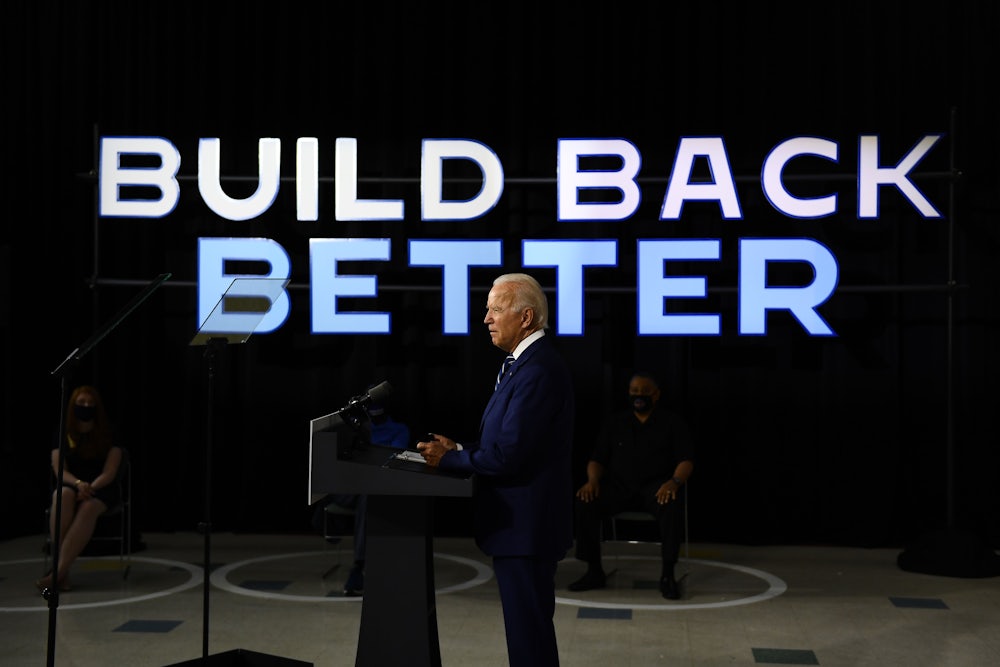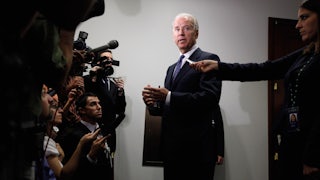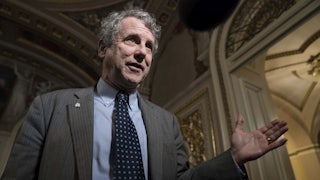There is a simple problem with the messaging surrounding the Democrats’ shrinking $3.5 trillion budget reconciliation package: No one knows what’s in it.
Recent polls from Quinnipiac University and CBS suggest that, despite all of the infighting and chaos, what might be in the bill is broadly popular—and some of its proposed items are extremely popular.
The Quinnipiac poll, released last week, found that 57 percent of adults supported the bill compared to 40 percent who opposed it, while CBS found it had 54 percent support. According to the CBS poll, a number of the bill’s key provisions are extremely popular: 88 percent support its plan for lowering prescription drug prices, 73 percent support federal funding for family and medical leave, and two-thirds are in favor of universal pre-K. And yet these same polls found that many voters don’t know these elements are even in the bill. Despite the fact that Democrats are working on such a popular bill, only 43 percent of voters want them to regain control of Congress, per Quinnipiac, with 46 favoring the GOP taking at least one branch.
Part of this may come down to a disconnect. As Democrats continue to bicker over its contents, significantly more attention is being paid to its top-line number than to its actual components. CBS found, for instance, that nearly 60 percent of voters knew what the bill cost—with the same number knowing that it contains tax increases for the rich—but only 40 percent knew that it contained measures to reduce prescription drug costs. Only 36 percent, meanwhile, believed that the bill would do something to help them directly.
These numbers should give Democrats pause. The Build Back Better Act is broadly popular—and, in specific terms, much of it is astonishingly popular—and yet most people only know it’s expensive, and relatively few believe it is immediately beneficial to their lives.
That this bill is big is the one constant of mainstream press coverage, which often skips over what it actually is doing. There is, in some of this, a familiar critique of the issue-allergic, deficit-obsessed mainstream press: Given the choice between covering public policy and covering a messy political fight, it’s unsurprising that many have chosen the latter. But it’s also somewhat forgivable, given that many of these policies may not make it into the final bill itself. Without an actual bill to work from, the emphasis, as Vox’s Andrew Prokop wrote last week, “has often been on Democratic disarray and legislative drama rather than on what the bill proposes to do for people.” (The situation is not helped by Kyrsten Sinema, who opposes many of the bill’s most popular provisions, particularly its measures to lower prescription drug prices, but has not said why.)
Moderates, aided by Republicans, have gleefully used the bill’s size as a way of undercutting many of its measures. When West Virginia Senator Joe Manchin called for a “strategic pause” last month, he noted that Congress shouldn’t be “rushing to spend trillions on new government programs and additional stimulus funding” and should instead be focusing its efforts on lowering the federal deficit and fighting inflation. This has become something of a vicious cycle for Democrats, in which members of their own caucus deride the bill for spending too much, leading to cuts in its popular elements, which drives down its popularity and political efficacy.
The political situation is further complicated by the fact that the Build Back Better Act is something of a grab bag, containing elements that fight poverty, expand health care, and combat climate change. It’s difficult to explain what exactly it’s doing without resorting to vague catch-alls, like “spending.” The Democrats’ own chosen slogan for it, Build Back Better, is, as my colleague Walter Shapiro wrote last month, confusing and imprecise—at the very least, it’s a better fit for the Democrats’ other bill, a $1 trillion infrastructure package that has some bipartisan support. The Democrats have struggled to come up with a simple way of explaining what they’re trying to do and seem to be convinced that voters will recognize their largesse as soon as they pass whatever it is they end up passing. But they didn’t receive much of a political bump from the Covid-19 relief bill they passed this spring, even though it contained direct cash payments to tens of millions of Americans, which suggests that the party’s messaging needs work.
Mostly though, these polls serve as a further reminder that the Democrats need to get their act together and actually pass a budget reconciliation bill. If they can do that, more focus will be on what the bill in fact does, countering the stories about its significant cost and the palace intrigue that has gone into putting it together. But until they do, they’re only making things worse for themselves.






